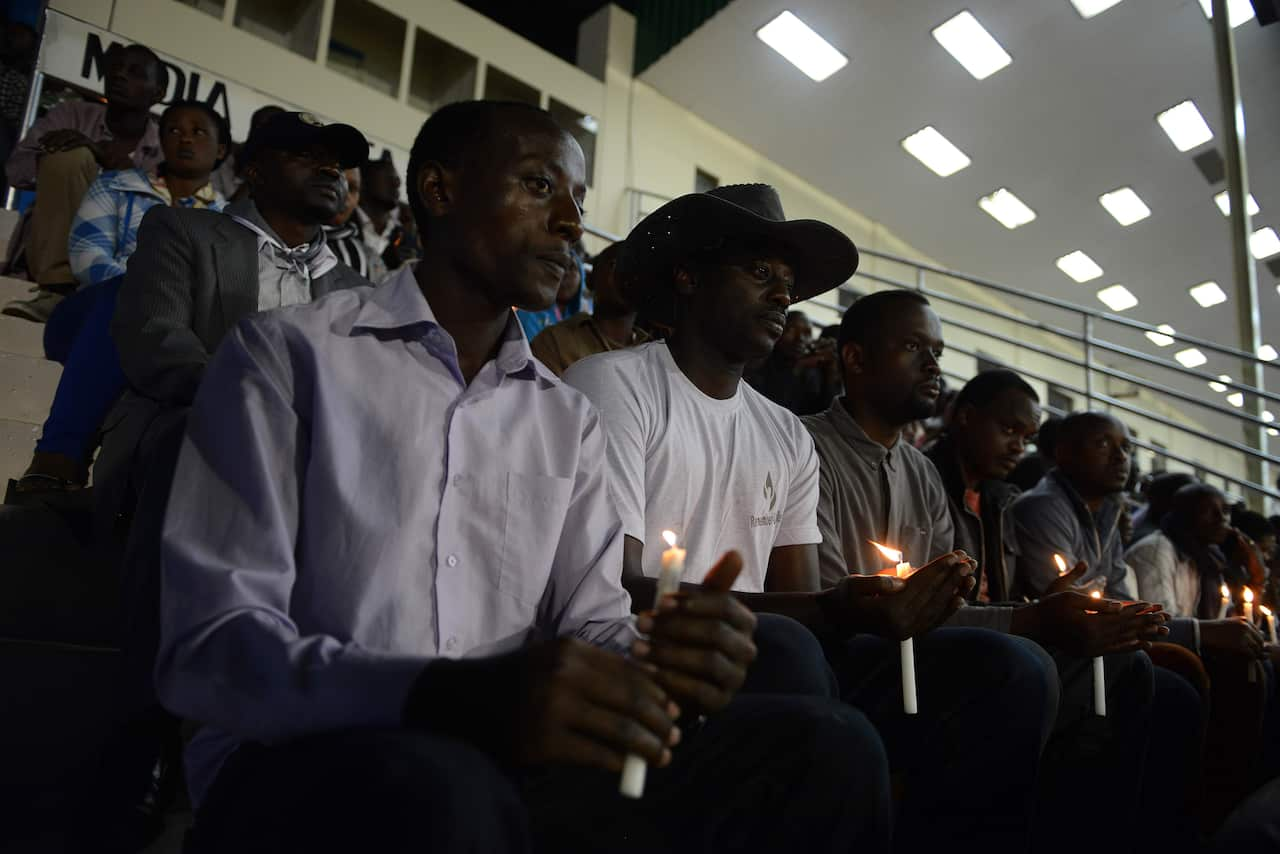Solemn commemorations marking the 20th anniversary of Rwanda's genocide bore reminders of a festering anger as a major diplomatic row broke out over allegations of France's complicity in the 1994 massacres.
The French ambassador to Kigali said he had been barred from the commemorations on Monday after Paris decided to cancel a ministerial visit in response to the renewed accusations by Rwandan President Paul Kagame.
Rwandan Foreign Minister Louise Mushikiwabo also told France that it had to face up to the "difficult truth" over its involvement in the murder of 800,000 ethnic Tutsis two decades ago.
LISTEN: 20th anniversary of Rwanda genocideOfficial mourning, which began three months ago with a flame of remembrance touring towns and villages across the small central African nation, culminates on Monday when the torch arrives at the national genocide memorial.
Kagame will light a flame that will burn for 100 days, the length of time it took government soldiers and "Hutu power" militiamen to carry out their plan to wipe out the "Inyenzi" - a term meaning "cockroaches" that was used by Hutu extremists to denigrate and designate the minority Tutsis.
The well-planned and viciously executed genocide began on April 6, 1994, soon after Hutu president Juvenal Habyarimana was killed when his plane was shot down over Kigali. Roadblocks were set up, with Tutsi men, women and children of all ages butchered with machetes, guns and grenades.

Custodians of the memorial say it contains the bones of a quarter of a million people now carefully stored in vast concrete tombs.
Wreaths were also laid, before ceremonies in Kigali's football stadium where UN Secretary General Ban Ki-moon and several African leaders are due to attend along with several top diplomats from the United States and European nations.
French officials, however, were absent.
"Yesterday night the Rwandan foreign ministry telephoned to inform me that I was no longer accredited for the ceremonies," the French ambassador, Michel Flesch, told AFP.
French Justice Minister Christiane Taubira had already pulled out of the events after Kagame repeated his accusation of French "participation" in the killings.
He said French soldiers - who helped train the Hutu nationalist-controlled Rwandan army before 1994, as well as being accused of aiding the killers to escape - were both accomplices and "actors" in the bloodbath.
"For our two countries to really start getting along, we will have to face the truth. The truth is difficult, the truth of being close to anybody who is associated with genocide understandably is a very difficult truth to accept," Foreign Minister Mushikiwabo said on Sunday.
France has repeatedly denied any direct involvement in the genocide, and unlike former colonial power Belgium, has refused to apologise or express any regret.
The UN chief has said the commemorations were a chance to remind the world to do all it can to ensure such crimes never happen again. The UN was also heavily criticised in 1994 for not doing more to stop the killings.
"The scale of the brutality in Rwanda still shocks: an average of 10,000 deaths per day, day after day, for three months," Ban said.
He said the impact of the massacres are still being felt across an "arc of uncertainty in Africa's Great Lakes region - and in the collective conscience of the international community".
"People everywhere should place themselves in the shoes of the vulnerable, from Syria to the Central African Republic, and ask themselves what more they can do to build a world of human rights and dignity for all," Ban said.
US President Barack Obama also paid tribute to the victims, saying the genocide "shook the conscience of the world".
"The horrific events of those 100 days - when friend turned against friend, and neighbour against neighbour - compel us to resist our worst instincts, just as the courage of those who risked their lives to save others reminds us of our obligations to our fellow man," Obama said in a statement.
"The genocide we remember today - and the world's failure to respond more quickly - reminds us that we always have a choice."
Many ordinary Rwandans said the events were bringing back painful memories.
"It is the day when the faces of all those I loved and died come back," said Marie Muresyankwano, a mother in her 30s, adding that she would watch events on television, but would otherwise spend time "with my own thoughts".
Rwanda's Red Cross has boosted its support staff for those hit hard by the memory of trauma.
The official "Kwibuka" mourning - meaning "remember" in Kinyarwanda - ends on July 4, Rwanda's liberation day.

